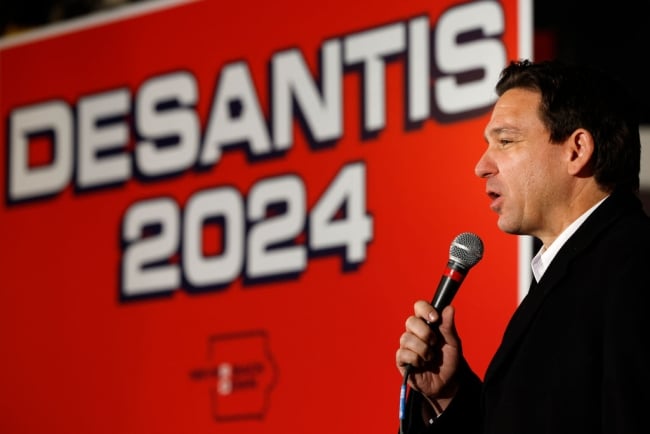You have /5 articles left.
Sign up for a free account or log in.

The Florida governor, seen here on the campaign trail, has regularly stated his opposition to diversity, equity and inclusion programs during his presidential run.
Chip Somodevilla/Getty Images
On Monday, the Florida Department of Education honored civil rights activist Martin Luther King Jr. for his “dedication to service and equality.” On Wednesday, Florida’s State Board of Education voted to prohibit spending on diversity, equity and inclusion programs at 28 state colleges.
The vote marks the latest strike against DEI programs in a state where such initiatives have come under fire from Republican governor—and current GOP presidential candidate—Ron DeSantis, who has called such programs both wasteful and “hostile to academic freedom.”
In the same meeting, the board also voted to replace a Principles of Sociology course with an American History course. The change, according to a department press release, aims “to provide students with an accurate and factual account of the nation’s past, rather than exposing them to radical woke ideologies, which had become commonplace in the now replaced course.” Now, sociology—King’s major at Morehouse College—will no longer be a core course option at state colleges.
The vote follows a similar move in November at the Florida State University System.
Florida commissioner of education Manny Diaz Jr., a former state Republican lawmaker, praised the move in Wednesday’s press release: “Higher education must return to its essential foundations of academic integrity and the pursuit of knowledge instead of being corrupted by destructive ideologies,” Diaz said. “These actions today ensure that we will not spend taxpayers’ money supporting DEI and radical indoctrination that promotes division in our society.”
Attacks on DEI
The rules passed Wednesday mean institutions in the Florida College System are prohibited “from using state or federal funds to administer programs that categorize individuals based on race or sex for the purpose of differential or preferential treatment,” according to the news release.
The change essentially formalizes DeSantis’s efforts to defund DEI at the public postsecondary level. The Florida Board of Governors enacted similar rules for the Florida State University System last fall.
Anti-DEI sentiment has been a prevailing theme for DeSantis, who began his broadside against such efforts last year when he pushed through sweeping legislative changes for higher education in areas such as DEI spending, tenure and more. As he prepared to launch his presidential campaign, he also appointed conservative activists to the New College of Florida Board of Trustees, who proceeded to ax both the college’s DEI office and the gender studies program.
And on the campaign trail, DeSantis has frequently railed against DEI.
“They say it’s diversity, equity and inclusion, but it’s really very ideological, and they’re trying to impose an agenda,” DeSantis said in a CNN Town Hall Tuesday night. “I think the way it’s actually practiced, it stands for discrimination, exclusion and indoctrination, and it’s wrong.”
That claim was echoed by State Board of Education chair Ben Gibson the next day.
“DEI is really a cover for discrimination, exclusion and indoctrination, and that has no place in our state colleges at all,” Gibson said at Wednesday’s board meeting. “Our state colleges need to be focused on learning and not any form of discrimination of any sort whatsoever.”
Another board member, Ryan Petty, posted on X, “Florida is where DEI goes to DIE.”
Critics React
But critics have raised concerns about academic freedom and censorship amid Florida’s DEI crackdown, arguing that such efforts are misguided and tantamount to restrictions on speech.
“With its actions today, the State Board of Education seeks to eliminate an environment of intellectual freedom at Florida’s universities and replace it with the official government suppression of speech,” Jeremy Young, director of Freedom to Learn at the free speech advocacy group PEN America, said in an emailed statement to Inside Higher Ed. “The regulations adopted today go beyond statute to introduce whole new categories of chilled expression, devastating Florida’s universities and cheapening the education of Florida students.”
Ben Crump, a well-known civil rights attorney, took to X to express concerns about the decision.
“We continue to go down a misguided path of censorship in Florida!” he posted Wednesday.
Equality Florida, an LGBTQ+ advocacy group, released a statement accusing the board of rubber-stamping “DeSantis’s agenda of censorship and surveillance.” It argued that board rules go beyond state laws against DEI spending and will harm student and faculty recruitment.
“This is a brazenly political attack on Florida’s colleges, and all minorities in Florida, and is one more way state agencies have been weaponized to support Governor DeSantis’s failing political ambitions. Shame on the State Board of Education for passing rules that weaken and threaten Florida’s colleges in service to one more manufactured culture war,” Joe Saunders, senior political director of Equality Florida, said in an emailed statement to Inside Higher Ed.
The American Sociological Association initially raised concerns about cutting the Principles of Sociology from general education course options months ago in a public comment to the Florida Board of Governors in November, accusing Diaz of being “uninformed” about sociology. In a statement to Inside Higher Ed on Thursday, after this article was published, ASA expressed its disappointment at the changes across state colleges and disputed the notion that sociology was a “radical” or “woke” ideology as Diaz claimed.
“Sociology is the scientific study of social life, social change, and the social causes and consequences of human behavior,” the statement read. “Sociologists bring expert knowledge and understanding to addressing challenging social problems that have broad public implications, including housing, poverty, health, crime, work, and education. Failure to expose students to the scientific study of the range of issues faced by American citizens would be a failure of civics education. We call on the Florida State Board of Education to reverse its decision and reinstate sociology as a core course option.”








